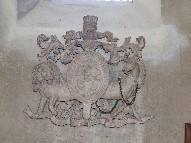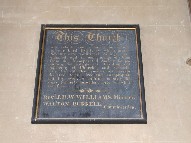| |
|
 |
|
Westley is a posh western
suburb of Bury
St Edmunds,
and it has a quite incongruous little
church. Even odder, perhaps, is that it
made it into the Sunday Times a
few years back after I described it here
as having ' the stiffest door lock of any
church in England'. That august
publication, in a review of this site,
obviously thought this was one of the
more significant things I had said about
the churches of Suffolk. In return, I
quoted their review in full, but a few
months later I received an e-mail in grim
officialese from one of Rupert Murdoch's
henchwomen, pointing out that
republication of material from Times
Newspapers without a licence was a breach
of copyright, and that I had 48 hours to
remove it. I wrote back immediately, in
what I thought was a charming manner,
suggesting that my reproducing their
review of my website on that very website
was not an unreasonable thing to do, but
they never replied. I am not one to bear
a grudge, but to this very day I have
never again bought a single copy of
anything published by the Murdoch Press. |
Be
that as it may, it was good to come back to
Westley on a day of bright sunshine. The affair
of the stiff key had happened back in 1999; I had
got it from a nice lady at the other end of the
village, and she had explained carefully to me,
as if to a small child, how to open the door.
Well, I stood struggling with the blessed thing
for about ten minutes, but could I get it open?
It just wouldn't budge. In the end, I took the
key rather sheepishly back, hoping to obtain
further instruction - but the lady had gone out,
so all I could do was pop it through her letter
box and slink off to Little Saxham.
Having
visited well over a thousand churches since I was
last in Westley, I thought there was a fair
chance my technique would have improved, and that
this time I would be able to get it open, even if
it did mean struggling manfully for ten minutes.
It also occured to me that, having made the
national press, the parish might well have
installed a new lock, or at least applied lavish
quantities of WD40 to the old one. As it was,
none of these thoughts were relevant, because I
found the church open.
St
Mary was built in 1836 out of concrete, in an
obstensibly Early English style, but the spire
had to be removed in 1960, and with its squat
little stump it looks like nothing so much as a
church from an Italian hill-top village. The
exterior cement had got rather ugly over the last
few years, with its plaster cracking and falling
off, but it has now been replastered and
repainted, and is gleaming white and thoroughly bellissima.
Incidentally, the parish claims that this is the
oldest concrete church in England, although I
believe that there is another church in
Lancashire which makes the same claim. By a
year's grace it is of course a Georgian church
rather than a Victorian one, a rare thing for
Anglican churches in Suffolk.
It
was built to replace the church of St Thomas of Canterbury, which was
badly damaged by a tower fall in 1744, and
eventually abandoned. The new church was built on
this hilltop site by the Marquis of Bristol,
simply because he wanted to have something to
look at from his Ickworth home while he ate his
breakfast. Being a great fan of European travel,
he would probably approve of the way his church
looks now.
| Inside, the church is simple
and functional, as you would hope and
expect of the Georgian period. The only
detail of note is the royal arms of the
House of Hanover, carved in wood and
plaster. It must have been one of the
last sets in England. On the wall nearby
is a board detailing the building of the
church, and a simple contemporary font
sits at the west end, again one of the
last pre-Ecclesiological examples. On
this day of bright sunshine the lancet
windows filled the interior with slats of
sheer light, casting across the dark
furnishings with a thrill of the
numinous. And if the Sunday Times
wants to quote me on that, they'd better
ask me first. |
|
 |
|
|
|

